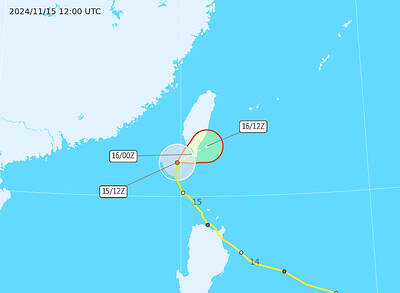Spare nuclear power can be tapped to ensure a stable power supply in the event of an emergency, Premier Lin Chuan (林全) said in an interview published yesterday as he reaffirmed the government’s energy transition goals.
Although the government plans to phase out nuclear power, a reactor at the Guosheng Nuclear Power Plant could be reactivated when necessary, Lin said in an interview with the Chinese-language Liberty Times (sister newspaper of the Taipei Times).
“Although [the reactor] is not considered part of the operating reserve, I would make a formal report to the Legislative Yuan to reactivate it as a last resort in the event of a predictable power shortage. The manufacturing industry should have confidence in the power supply,” Lin said.

Photo: CNA
However, he reaffirmed the government is committed to phasing out nuclear power while boosting natural gas-generated power and renewable power to 50 percent and 20 percent of the total power generation respectively, and reducing coal-fired power to 30 percent by 2025.
“Taiwan has few natural resources and there are problems with either nuclear power, coal-fired power or natural gas-fired power. We have to make a choice, but nuclear power is too dangerous. The nation would be endangered in case of a nuclear disaster,” he said.
Pressed by reporters about Lin’s comments, Executive Yuan spokesman Hsu Kuo-yung (徐國勇) yesterday said that the reactor would only be used as a last resort to maintain an adequate power supply.
“Unless there is no other way to keep power from running short, there are no safety concerns, and society agrees to reactivate the idle nuclear reactors, the reactors at the first and second nuclear power plants will not be restarted,” Hsu said.
The shutdown of a power plant in Hualien County after a typhoon last month downed a transmission tower resulted in contingency energy-saving measures, and the malfunction of a power plant in Taoyuan that caused a massive outages around the nation on Aug. 15 have pointed to grid management problems, not the need for nuclear power generation, Lin said.
The Democratic Progressive Party, shortly after it won the general elections last year, told Taiwan Power Co (台電) to plan an electricity supply scheme without extending the lifespan of the nation’s three active nuclear power plants or activating the mothballed Fourth Nuclear Power Plant, Lin said.
Wind and solar power and a stable grid storage system have to be developed to ensure uninterrupted supply in off seasons to achieve such a goal, and a “smart” grid system has to be established to reduce power consumption during peak hours, he said.
The development of solar power, although technically more viable, is limited to land availability, so wind power has more potential than solar power, he said.
Major wind power farms could begin operations in 2020, and they could generate about 3.5 gigawatts (GW) to 4GW by 2025 when all three operating nuclear plants are due to be decommissioned, he said.
It is important to reduce peak hour consumption to maintain stable supplies without building more power plants, Lin said.
A “smart” household meter system would allow users to know real-time consumption and encourage them to adopt a flexible electricity pricing system, which demands a high rate during peak hours while offering during off-peak times.
The government has been developing a “smart” meter system, with 1 million households set to install the system by the end of 2019 and 3 million households in 2020, he said.
Additional reporting by CNA

Tropical Storm Usagi strengthened to a typhoon yesterday morning and remains on track to brush past southeastern Taiwan from tomorrow to Sunday, the Central Weather Administration (CWA) said yesterday. As of 2pm yesterday, the storm was approximately 950km east-southeast of Oluanpi (鵝鑾鼻), Taiwan proper’s southernmost point, the CWA said. It is expected to enter the Bashi Channel and then turn north, moving into waters southeast of Taiwan, it said. The agency said it could issue a sea warning in the early hours of today and a land warning in the afternoon. As of 2pm yesterday, the storm was moving at

UPDATED FORECAST: The warning covered areas of Pingtung County and Hengchun Peninsula, while a sea warning covering the southern Taiwan Strait was amended The Central Weather Administration (CWA) at 5:30pm yesterday issued a land warning for Typhoon Usagi as the storm approached Taiwan from the south after passing over the Philippines. As of 5pm, Usagi was 420km south-southeast of Oluanpi (鵝鑾鼻), Taiwan proper’s southernmost tip, with an average radius of 150km, the CWA said. The land warning covered areas of Pingtung County and the Hengchun Peninsula (恆春), and came with an amended sea warning, updating a warning issued yesterday morning to cover the southern part of the Taiwan Strait. No local governments had announced any class or office closures as of press time last night. The typhoon

At least 35 people were killed and dozens more injured when a man plowed his car into pedestrians exercising around a sports center in the southern Chinese city of Zhuhai on Monday night. Footage showing bodies lying on the pavement appeared on social media in the hours after the crash, but had vanished by early Tuesday morning, and local police reported only “injuries.” It took officials nearly 24 hours to reveal that dozens had died — in one of the country’s deadliest incidents in years. China heavily monitors social media platforms, where it is common for words and topics deemed

Typhoon Usagi yesterday had weakened into a tropical storm, but a land warning issued by the Central Weather Administration (CWA) was still in effect in four areas in southern Taiwan. As of 5pm yesterday, Tropical Storm Usagi was over waters 120km south-southwest of Oluanpi (鵝鑾鼻), the southernmost tip of Taiwan proper, and was moving north at 9kph, CWA data showed. The storm was expected to veer northeast later yesterday. It had maximum sustained winds of 101kph, with gusts of up to 126kph, the data showed. The CWA urged residents of Kaohsiung, Pingtung County, Taitung County and the Hengchun Peninsula (恆春) to remain alert to